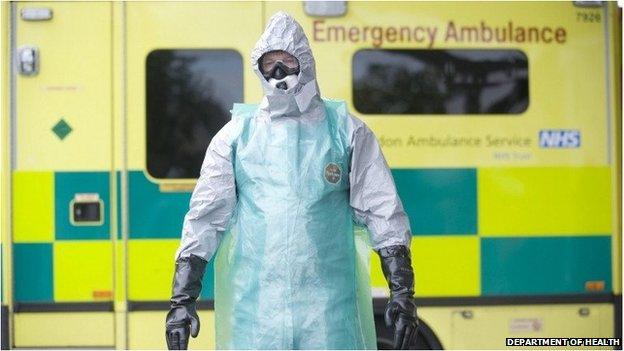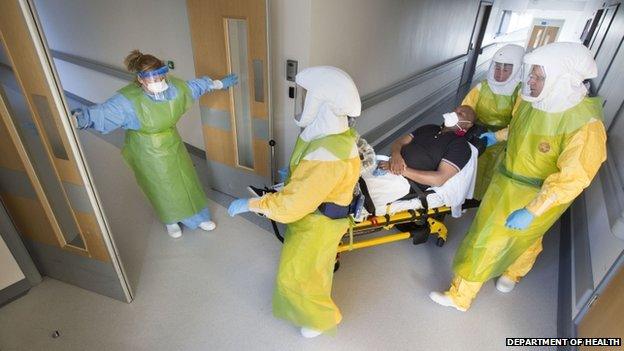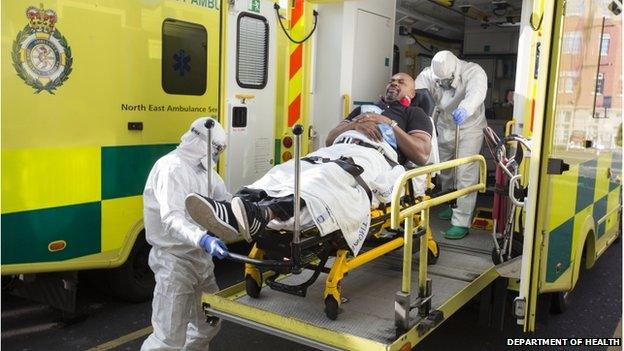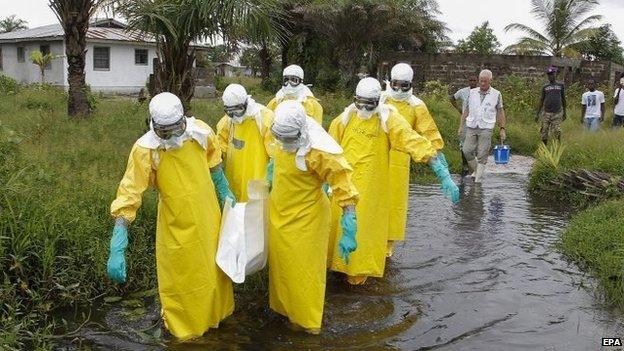Ebola screening for NHS 111 calls announced
- Published

Jeremy Hunt said medics would have protective equipment, as they did in UK test exercises on Saturday
Call handlers on the NHS non-emergency 111 phone line will try to identify possible Ebola sufferers, in the latest move announced by the health secretary.
Jeremy Hunt said anyone phoning with possible symptoms would be asked about their travel history and referred to local emergency services if necessary.
He said paramedics sent out would have "appropriate protective equipment".
The health secretary also said it was now "more likely than not" that Ebola would reach the UK.
The government has already announced screening starting this week at some airports and Eurostar terminals.
Prime Minister David Cameron said the UK was taking "very vigorous steps" to protect people.
In the US, President Barack Obama said hospitals should improve safety measures after a nurse in Texas who treated an Ebola patient tested positive for the virus.
Jeremy Hunt: "The risk in the UK remains low but we have to prepare for the situation getting worse"
Officials said the female health worker had become infected with the virus despite wearing full protective clothing.
Mr Hunt is to update MPs later on the UK's readiness to cope with a potential Ebola outbreak.
The health secretary said he would announce changes to procedures "across the NHS" and provide an estimate of the number of cases the UK needed to prepare for in the next three months.
It comes after the UK held an exercise on Saturday to test the national response.
'High risk'
People who call 111 and report symptoms such as respiratory problems or vomiting will be asked about their travel history, Mr Hunt said.
He said anyone who had "recently been to West Africa and is at high risk of having been in contact with Ebola" would be assessed by emergency services.
Speaking on BBC Breakfast, Mr Hunt said he thought "very few" people would use the service.
"But we have to prepare for the situation getting worse. And in West Africa now the incidence of Ebola is doubling every three to four weeks," he said.
"So I want to make sure we are prepared for the fact it is now more likely than not that someone will arrive in the UK with Ebola and one of the most crucial things in that situation is what happens when they make their first contact with the NHS."
He added that the risk to the public in Britain "remains low".

An actor playing a patient in Saturday's exercise was taken to the Newcastle's Royal Victoria Infirmary

Medics in the exercise wore full protective suits, which can be used to stop the spread of the Ebola virus
On Sunday, Mayor of London Boris Johnson said the government was at risk of promising "stuff that doesn't really make any sense".
He said screening - which is due to be introduced at Heathrow and Gatwick airports and Eurostar terminals from this week - was "far from perfect".
Mr Johnson said blood tests could not be done on every passenger and temperature checks would not pick up infected people who had not yet developed symptoms - which can take up to three weeks.
'Blunt instrument'
Passenger screening is expected to focus on people who have recently been to the worst-affected West African countries - Sierra Leone, Liberia and Guinea.
Dr Ron Behrens, from the London School of Hygiene and Tropical Medicine, said identifying possible sufferers through the NHS 111 service was "very resource-intensive" and would offer "low-quality detection" of cases.
And in an email seen by the BBC, a consultant has called the screening programme a "political gesture" which was "unlikely to provide public health benefits".
But Mr Cameron said: "There are no direct flights from Guinea, Liberia and Sierra Leone but people are coming in indirectly.

More than 4,000 people have died during the Ebola outbreak
"We should be trying our best to screen them and that will begin this week.
"Not only are we doing more than almost any other country in the world to deal with this problem at source in Sierra Leone and other countries, we are also taking very vigorous steps here to make sure we keep our people safe."
The government's chief medical officer, Dame Sally Davies, said although the programme was a "blunt instrument" it would save lives.
Screening is under way at New York's JFK airport, and checks at some other US airports are due to start in the coming days.
Figures published by the World Health Organization, external on Friday showed there had been 4,024 confirmed or suspected Ebola deaths in Guinea, Liberia and Sierra Leone during the current outbreak.
WHO director-general Margaret Chan said on Monday that the Ebola outbreak had shown "the world is ill-prepared to respond to any severe, sustained and threatening public health emergency".
In a statement she said: "I have never seen a health event threaten the very survival of societies and governments in already very poor countries. I have never seen an infectious disease contribute so strongly to potential state failure."